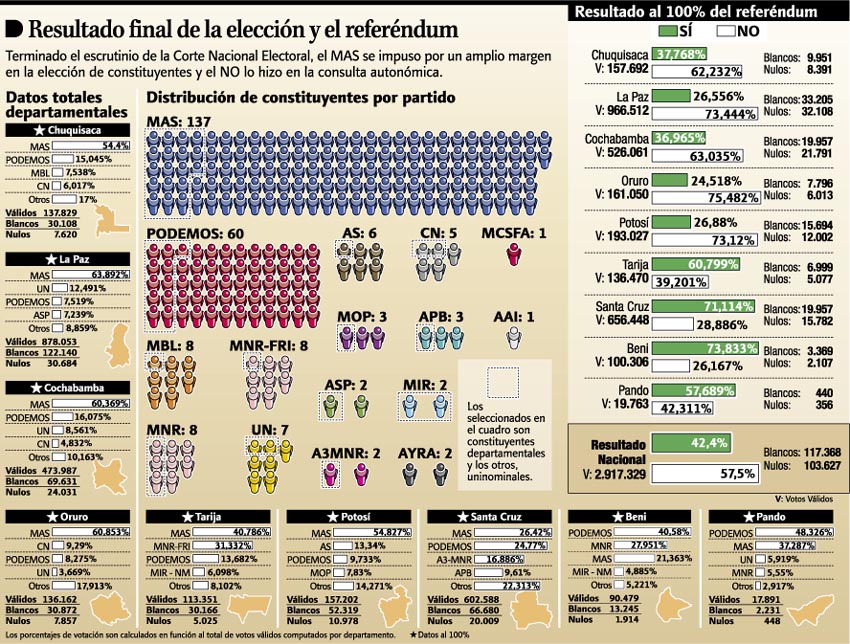Final, official seat distributions
07.11.2006Technorati tags: Bolivia politics elections
It's been a doozy, w/ seat distribution projections changing from day to day. But the final tallies were in last night, and today La Razón published the final, official list of delegates elected to the Bolivian constituent assembly. Several of the seat numbers changed from earlier projections.
ASI (Alianza Social Integradora), a regional Santa Cruz list headed by the Marxist-socialist Jerjes Justiniano, didn't win its projected seat. Several other parties also won fewer/more seats than originally projected.
These seat distributions give MAS 53.7% of the total seats. The next largest seat shares are for Podemos (23.6%), the three MNR lists (7.1%), MBL (3.1%), and Unidad Nacional (2.7%).
By making savvy regional alliances — particularly the alliance w/ FRI in Tarija (the Frente Revolucionario de Izquierda was traditionally a MIR ally, and carried the department for MIR since the 1980s) — propelled the party into the third-largest political force in the country, and the only pre-2003 political party to survive into the current period.
The success of other regional movements effectively hindered Podemos, w/ many three-way contests in media luna electoral districts benefitting MAS. Nevertheless, Podemos allies AAI (Alianza Andrés Ibañez) & APB (Autonomía Para Bolivia) managed to score important victories in Santa Cruz. Despite his lack of national popularity, Hormando Vaca Diez (ex MIR senator), placed second in his district (edging out another Podemos ally, APB, in a contest where MAS finished fourth, just ahead of the A3-MNR).
The strategy of vote-splitting also had mixed results for MAS. The pre-electoral alliances w/ MBL & MOP give the MAS-led bloc only 148 delegates for 58.0% of the seats. Again, if we add the other potential MAS allies (ASP, MCSFA, AS, AYRA), they total 159 delegates (or 164 if we add the Christian Evangelical Concertación Nacional) for a total of 62.4% of the seats (or 64.3%). Not enough for the two-thirds supermajority Evo Morales wanted. Combined, the likely anti-MAS bloc (Podemos, MNR, APB, MIR, AAI) holds 32.9% of the seats (or 35.7% if joined by Unidad Nacional).
Unidad Nacional emerges as the "king maker" party. No MAS-led alliance can reach a supermajority w/o the party's support. Which also means no anti-MAS bloc can check MAS proposals w/o the party's support. The result is, essentially, a continuation of the 2005 election's status quo in most respects: MAS dominates the political landscape, but not enough to enact — through the legislature — any constitutional changes w/o significant consultation & consensus from the opposition.
Posted by Miguel at 11:22 AM
